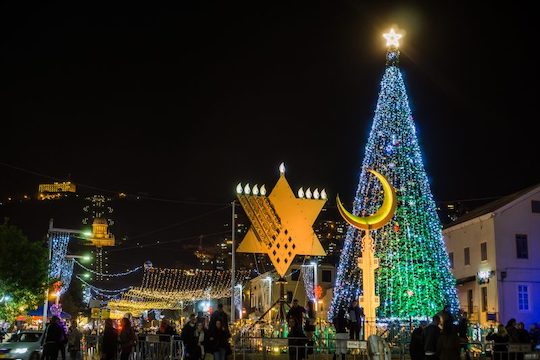Do you hear the sounds? Imagine what had once been the noisiest place in the region, bereft of its normal occupants, quiet in the wake of a war only just won, with a small number of victors searching and searching and searching. Occasionally those few would find a container only to discard it, moving on to look for another, until finally, finally, they found one with its seal still intact. Can you hear the relief? Can you hear the concern that one is not enough?
Do you smell the scents, the incense lingering to mask the many other smells, smells of animals and blood, of roast meat, of fire and familiarity? Can you make out the distinct stench of crowds from nearby and the stink of pilgrims from far away? Now can you smell the remainder of profane pork, perhaps sweet in its scent and yet out of place for this Place?
Do you feel the textures, the hard stone underfoot and up the walls serving as a solid foundation for faith and the faithful? Does the rub of a coin call up a sale or a sacrifice? Can you feel the heartbeat of the bird or the slipperiness of the oil? Are your feet tired from the journey to and through this majestic site?
Do you taste the flavor? Your share of roasted meat, of flour, and oil offered in holiness is not your usual fare. Is it better than a meal from home or simply different? Is the taste something you have longed for or rather something you endure only in its time? Can you taste holiness?
Do you see? It is there, high on a hilltop, gilded and great. Yes, it has been profaned with idols of Greek gods now smashed. Still, it is the same building, the same structure, the Solomonic edifice you have known as the Temple. Can you behold its wonder even though it has changed hands from Jews to Greeks and back to Jews?
Hanukkah commemorates the Maccabean victory of a small band of religiously motivated Jews over a powerful Syrian Greek army who sought to impose Greek religious and cultural practices on the Jews of ancient Israel. The Festival of Lights focuses on the sole cruse of sanctified oil, enough for one day, lasting eight days, just long enough to produce more holy oil to carry forward. Jews today light candles and fry foods in oil to celebrate. Jews also play games and give gifts to remember subsequent ways Jews had to hide the study of Jewish texts. These traditions help to keep the memory alive, some playing on the sense stronger than others.
At a holiday concert this year, I was struck by the way the music of the season could carry us some place special. The playlists repeating in stores signal the time of year, but the music of each faith tradition trying to lighten and brighten the dark has more to say. I am no expert on music, so rather than write about songs, I asked you to engage your senses. That being said, “Winter Wonderland,” with its sleigh bells ring(ing), was written by an Episcopalian and composed by a Jew and sounds like light in its form and content. Songs for the holidays share themes of peace, hope, change, and, yes, finding the divine. I wonder if we listened to the less commercial songs if we might find ourselves walking in a better world, or at least sensing one. Are you listenin’?
About Rabbi Jeremy Winaker
Rabbi Jeremy Winaker is the executive director of the Greater Philadelphia Hillel Network, responsible for West Chester University, Haverford, Bryn Mawr, and other area colleges. He is the former head of school at the Albert Einstein Academy in Wilmington and was the senior Jewish educator at the Kristol Hillel Center at the University of Delaware for four years. Rabbi Winaker lives in Delaware with his wife and three children.


Comments